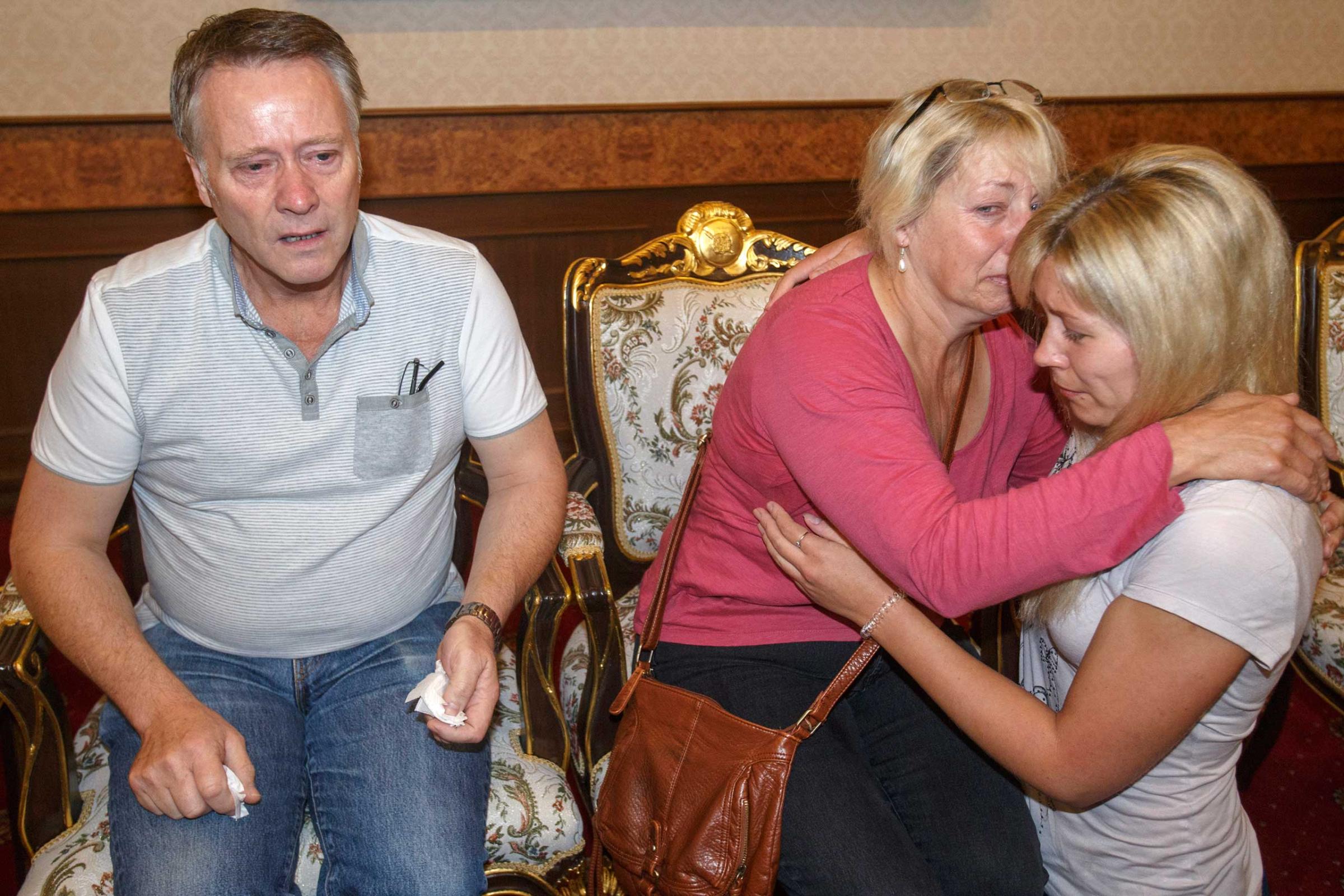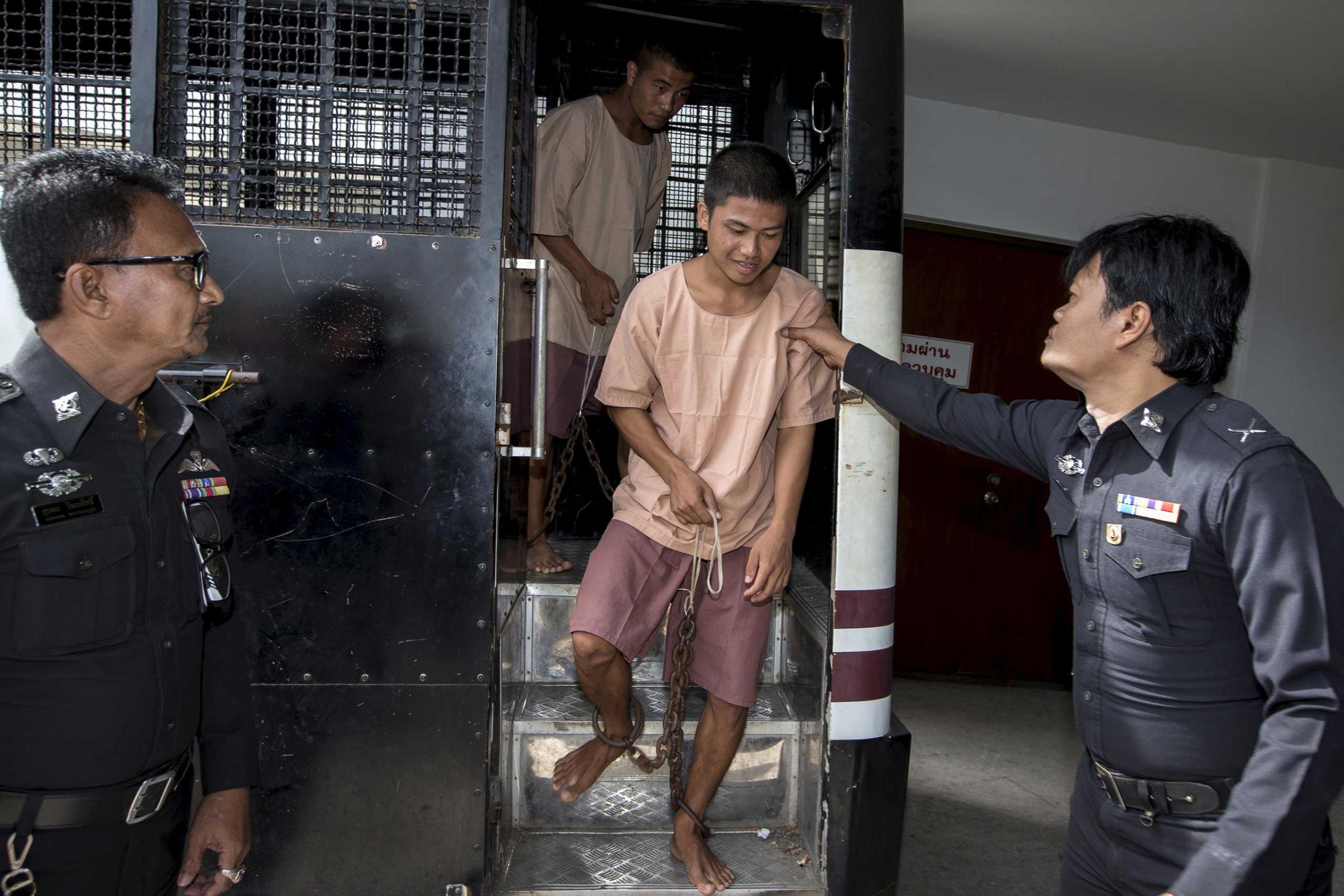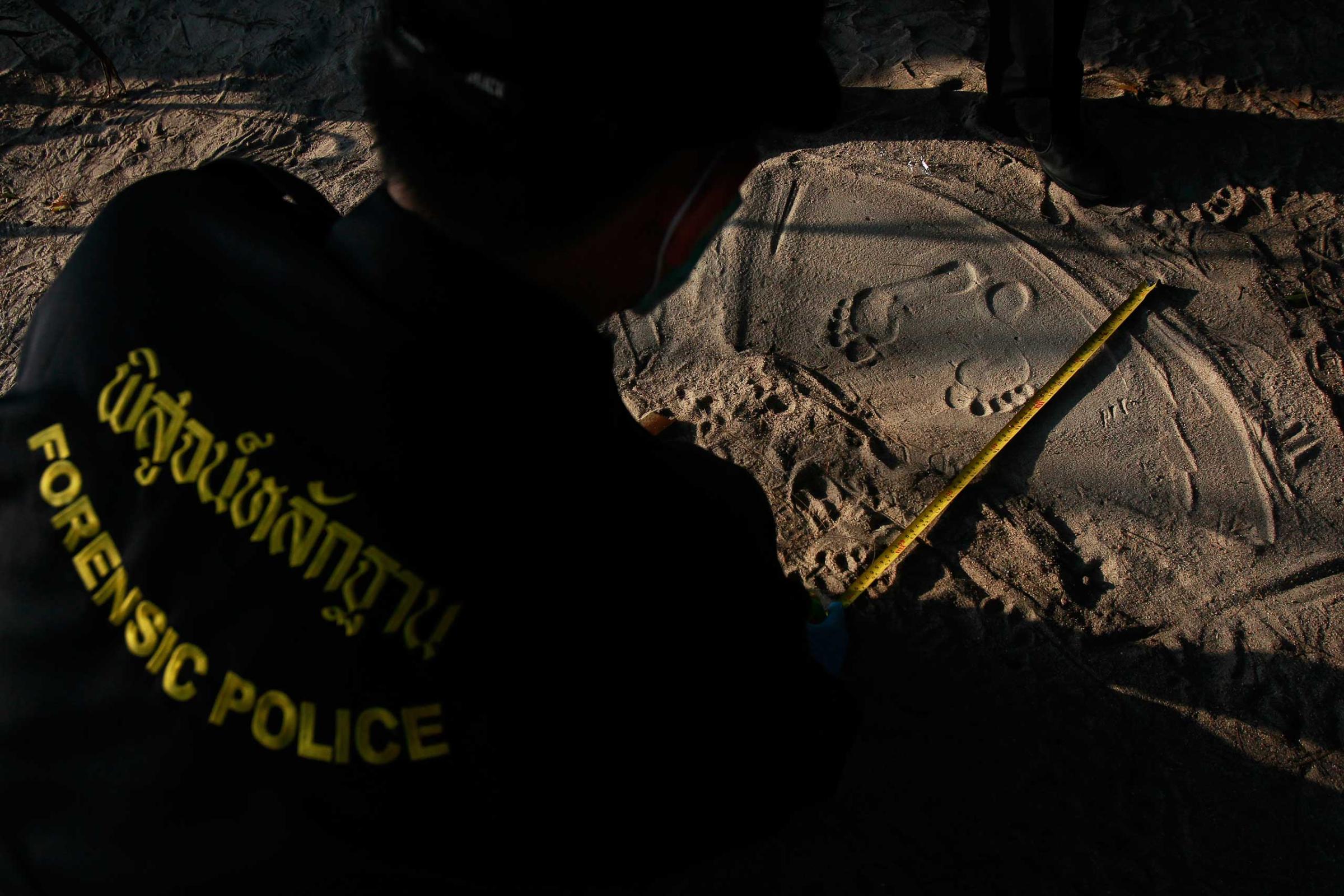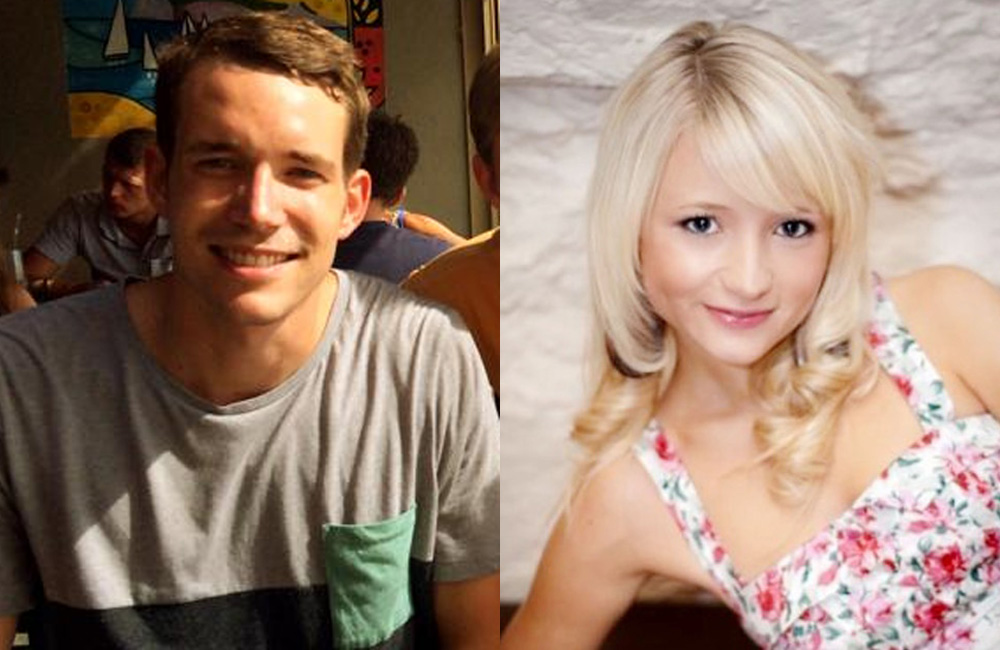The balcony of room A5 at Ocean View Bungalows commands one of the finest vistas of Koh Tao’s sweeping Sairee Beach. Traditional longtail boats, a rainbow of scarves adorning their bows, bob on the lapping water of the glistening bay. And right in the foreground, rising proudly from sliver sands, protrude a scattering of granite boulders, a furtive relic of this tranquil 21-sq-km (8 sq. mi.) island’s volcanic inception.
These rocks are no strangers to explosive secrets. On Sept. 15, one of the occupants of that same room A5, Hannah Witheridge, was found bludgeoned to death in their midst alongside fellow British tourist David Miller, just a short stumble from her door. Witheridge, 23, from Great Yarmouth, a seaside town on the English east coast, had been raped and killed by blows to the head. Miller, a year older and from Jersey, one of the U.K.’s Channel Islands, had likewise suffered deep lacerations to his skull before drowning in the shallow surf.
A mute Burmese beach cleaner stumbled upon the bodies shortly after dawn. A garden hoe and wooden club found nearby were quickly fingered as the principal murder weapons.
The crime’s brutality amid Koh Tao’s insular, backpacker charm caused an international sensation and threatened to further weaken a tourist industry already reeling from the military coup of May 22, 2014, which saw hundreds arbitrarily detained and draconian new controls imposed on freedom of speech and assembly.
Junta chief General Prayuth Chan-ocha enraged many by hinting that the blame, at some level, lay with the attractive victims. “Will [tourists] survive in Thailand if they dress in bikinis?” he asked Sept. 17. He added that they would if “they are not beautiful.”
Prayuth soon backtracked on his remarks on travelers, saying, “Sometimes I speak too strongly.” But virtually his next breath again sought to assign blame: “We have to help take care of [our nation],” he said, “and not let not-good people mingle with us, such as unregistered alien workers.”
Investigators had already steered their attention to migrant workers, via a friend of the deceased, and the son of a local headman, who were briefly considered as suspects. DNA testing of casual workers was introduced and many migrants complained of rough interrogations, with some claiming that they were scalded with boiling water. (Police deny these allegations.)
Zaw Lin and Wai Phyo, both 22-year-old ethnic Rakhine from Burma’s restive Arakan state, were arrested on Oct. 2. The police quickly elicited a confession and, after a macabre reconstruction of the murders before a swarm of media — including a staged session of penitent prayers by the accused — probably hoped that the case looked closed.
But it unraveled just as quickly. After finally receiving independent legal counsel, Zaw Lin and Wai Phyo, who had no prior criminal records, claimed they had been tortured during interrogation and recanted. Human-rights groups expressed serious concerns.
The 18-day trial of the two defendants, divided into three equal parts over several weeks, began on July 8. A verdict is expected in October and they could face the death penalty if convicted.
“Over the coming weeks we hope to gain a better understanding as to how such a wonderful young man lost his life in such idyllic surroundings in such a horrible way,” said Miller’s family in a statement at the opening of the trial.

‘THE WORST THAIS IN THAILAND’
The murders of Witheridge and Miller sent shock waves through Thailand. “That the victims were tourists automatically drew more attention,” says Thai political analyst Saksith Saiyasombut. “And the shambolic investigation also didn’t help.”
Foreigners die surprisingly often here. There were 362 U.K. citizens who met their end in Thailand in 2014, more so even than in France, which attracts almost 20 times as many British visitors. But generally they lose their lives through traffic accidents, overdoses and suicides. This was very different.
Of the 25 million foreign visitors who touch down in Thailand each year, half a million grace Koh Tao, the smallest of three popular tourist islands in the Thai Gulf. The largest and most developed is Koh Samui, which also boasts the archipelago’s only international airport. The next in size is Koh Phangan, home of the infamous Full Moon parties, with a reputation for drugs and debauchery. Koh Tao is by far the smallest. Ringed by coral gardens and teeming with kaleidoscope shoals of tropical fish, it was primarily known, until now, for its diving.
But Koh Tao was a political penal colony from 1933 until 1947, and a sense of self-sufficiency and isolation exists to this day. Far from official oversight, de facto control falls to the owners of booming hospitality businesses that were developed on land originally obtained, via government concessions, for coconut plantations.
Feuding here is common and vicious. Greg Shepherd, 34, from Luton in the U.K., tells TIME he witnessed a man getting shot in the face in a bar north of Sairee Beach in the mid-2000s. “They took the victim away in a pickup truck and the barman just got a mop out and cleaned up the blood,” he says.
In general, tourists are almost comically unaware of this malevolent undercurrent. Yet it remains an open secret that “organized crime is rampant on these islands,” says Saksith. Little wonder the conversational staple of many long-term expats is, “These are the worst Thais in Thailand.”
Drugs play a key role. The sweet reek of marijuana is commonplace even in prominent beachfront bars, while cocaine and crystal meth, known locally as yaba or “crazy drug,” are not hard to find, say locals. At one establishment by Chalok Baan Chao, joints are sold for 200 baht ($6) while a magic mushroom milkshake costs 700 baht ($20). “Nice and strong,” grins the heavily tattooed barman. The families that run the island and police that guard it deny any involvement with narcotics. But the sheer ubiquity of drugs on Koh Tao suggests at the very least a high toleration of the trade.
Naturally, a pall of silence engulfs this clannish, cliquey atoll, owing in no small part to the legal standing of its foreign contingent.
There are no official figures for the number of expats who call Thailand home, but it likely runs into the hundreds of thousands. Pensions and incomes that would be less than optimum in Europe, say, or North America, can fund a life of carefree hedonism in Thailand.
On tiny Koh Tao alone, there are some 2,000 expats alongside the 2,500 registered Thais, according to Mayor Chaiyan Turasakul. Most are running guesthouses, eateries and scuba-diving operations or working as diving instructors. However, according to Rhys Bonney, an immigration adviser to expats in Thailand, even the legality of scuba-diving instructors is an “extremely gray area” as Thai work permits are specific to particular company premises. “There’s no work permit that allows you to work in 15 different locations [under the sea],” he says. “Legally, it would seem quite easy to shut these dive shops down.”
Insecure residency tends to breed compliance. “Once you’ve been living there for a while, you’ll turn a blind eye to some pretty sketchy stuff,” says Mike Earley, 30, from New Zealand, who spent six months on the island working as a DJ. Complaining about wrongdoing may invite official questions and demands for passports and documentation. Expats “don’t want to lose their time in paradise,” Earley says, “as it’s cheap, it’s nice living, and it’s very easy to ignore what happens.”
Even murder.

SEVEN DAYS A WEEK FOR A PITTANCE
Zaw Lin and Wai Phyo are two of an estimated 2 million irregular Burmese migrants, along with smaller numbers from neighboring Cambodia and Laos, currently working low-paid jobs in comparatively thriving Thailand. They toil in slavelike conditions for pitiful wages in occupations typically described as 3-D — dirty, dangerous, degrading.
Some work on fishing boats for years without seeing land, getting passed between trawlers, catching fish, squid and shrimp for American dinner tables. (Thailand is the world’s third-largest seafood exporter.) Others labor for long hours under the burning sun farming pineapples, exposed to hazardous doses of pesticides and other chemicals. And on Koh Tao there are around 5,000 Burmese — conspicuous by the golden streaks of thanaka paste, a traditional sunscreen and beauty product, garnishing their cheeks — who build hotels, sweep rooms and serve drinks to the coppery throngs of tourists.
They flee extreme poverty and ethnic violence in Burma (officially now known as Myanmar), the legacy of a half-century of civil war and suffocating military dictatorship. Even though recent quasi-democratic reforms have seen an influx of tourist dollars and the rolling back of sanctions, that means little for the nation’s rural poor. In fact, says Sean Turnell, a professor and expert on Burmese economics at Australia’s Macquarie University, “The economic circumstances of Myanmar’s majority rural population are now marginally worse than before the reforms were launched.”
Zaw Lin and Wai Phyo know this too well. Speaking exclusively to TIME at Koh Samui Prison, both appear much younger than their 22 years. Zaw Lin, as pimply as any teen, chats eagerly of his love of Manchester United and star Portuguese winger Nani. Wai Phyo, a Real Madrid fanatic who idolizes FIFA world player of the year Cristiano Ronaldo, moves a virtually hairless top lip as he talks.
“My father died when I was very young,” says Zaw Lin, “so l left school aged 8 and started helping my mother in the fields when I was 10.” Facing worsening poverty, around two years ago he paid a broker 5,000 baht ($150) to transport him to Koh Tao, heartened by tales he’d heard of fellow villagers who had eked out a successful living there. Since then, he had managed to send back almost $2,000 to help his destitute family. “It’s something but it’s not enough,” he says.
To be able to work on Koh Tao, illegal Burmese migrants paid a 500-baht ($15) bribe each month, plus another 500 baht if they want to use a motorbike without a Thai driving license. Typically, they work seven days a week for a pittance, sleeping in bamboo shacks erected in jungle clearances. Possessing no official status or documents, their vulnerability is extreme, and complaints of rape, extortion and physical violence are legion. “Burmese people are treated as second-class citizens,” says Saksith. “Dehumanizing as it sounds, they are a commodity for some people.”
Asked whether he has a message for his compatriots considering working in Thailand, Wai Phyo simply says, “Be careful when you go out at night as you might step in the wrong place.”

‘WE HAVE LEARNED TO TAKE CARE OF VISITORS’
Theories abound on Koh Tao about who killed Miller and Witheridge. Many believe the true culprits are local, and these suspicions were fueled after a Scottish friend of Miller fled the island claiming to have had his life threatened by local thugs.
Nevertheless, few have rallied to the defense of the accused. One of Wai Phyo’s former employers, who saw him soon after Sept. 15 and noticed no perceivable change in his demeanor, has refused to be a character witness or be named by TIME. “I’ve not been threatened, but I’ve too much to lose,” he says. “This is the wild west.”
At present, the case rests on DNA evidence linking cigarette butts found around 20 m from the bodies next to a crooked log where Zaw Lin and Wai Phyo admit they were playing guitar and drinking beer on the evening in question. These samples purportedly match those retrieved from Witheridge’s corpse.
But many have concerns that the scene was contaminated immediately after the discovery of the bodies; myriad officials, journalists and even bewildered tourists were seen traipsing through the area while evidence was still being gathered. Gruesome photos of the bloodied corpses circulated online, either leaked by officials or even taken by passersby. Thailand’s forensics chief, Dr. Pornthip Rojanasunand, has said that by not using trained specialists, “police contradicted the principles of forensic science.”
Forensic evidence is processed independently in the U.S. or U.K. and many other jurisdictions around the world, safeguarding a proper chain of custody. But in Thailand, the police perform the entire process. This is troubling when set against the allegations of torture made by the accused.
Wai Phyo says officers removed his clothes and left him naked in a freezing room for 20 minutes. “They beat me and put a bag over my head, humiliating me by taking pictures and a video,” he said. “They threatened to kill me, saying: ‘We can throw you into the sea and feed your corpse to the fish.’”
Thailand’s National Human Rights Commission investigated these allegations, but progress has been glacial, not least because police representatives failed to turn up to four arranged meetings. The police categorically deny any mistreatment and no officer has been charged to date.
Torture allegations aside, the proceedings have been peppered with oddities. The families of Miller and Witheridge even put out a statement saying the evidence against Zaw Lin and Wai Phyo was “powerful and convincing.” This assertion was facilitated by the U.K. Foreign Office despite being prejudicial toward the possibility of a fair trial. (Both families declined to comment when contacted by TIME.)
More recently, a court order to allow Dr. Pornthip to review the DNA evidence was rescinded. “The defense lawyers urgently need both crucial information gained from the re-examination of forensic evidence in this case and also adequate time to consider this information prior to the trial beginning,” said lead defense lawyer Nakhon Chomphuchat in a statement last month.
On July 10, the bench again ordered the DNA to be retested, only for the police to reveal that certain key samples — specifically those retrieved from the victims’ bodies — had been used up. The only items still available for retesting were objects found around the crime scene, including the suspected murder weapons, but one witness claimed that these had been washed.
According to Kingsley Abbott, Southeast Asia legal expert for the International Commission of Jurists, “The defense must be afforded adequate time and facilities to explore whether the alleged destruction of evidence in this case was appropriate and unavoidable, and to test the prosecution case overall.”
Back on Koh Tao, authorities have scrambled to blot out the tragedy. “Koh Tao is very safe,” says Mayor Chaiyan. “Because we have learned for generations to take care of visitors.” A brand new police station has been built with 40 full-time officers replacing the five previously based here. A process of registering irregular Burmese migrant workers has been introduced to tackle the semiofficial bribes, though many say abuses continue unabated.
Few of the visitors on Sairee Beach today are even aware the murders took place. “I had no idea,” says Jordi Cramer, 21, a waitress from Edmonton, Canada, when TIME speaks to her strolling past the granite-hemmed crime scene. “I did feel safe, but that is scary.”
Scared is right. For while the surf has washed the blood from the sand, and life returns to normal for the island’s hodgepodge of wealthy and penniless inhabitants, one fact remains clear: not just the boulders hide secrets on Koh Tao.

More Must-Reads from TIME
- Caitlin Clark Is TIME's 2024 Athlete of the Year
- Where Trump 2.0 Will Differ From 1.0
- Is Intermittent Fasting Good or Bad for You?
- The 100 Must-Read Books of 2024
- Column: If Optimism Feels Ridiculous Now, Try Hope
- The Future of Climate Action Is Trade Policy
- FX’s Say Nothing Is the Must-Watch Political Thriller of 2024
- Merle Bombardieri Is Helping People Make the Baby Decision
Write to Charlie Campbell / Koh Tao and Koh Samui at charlie.campbell@time.com